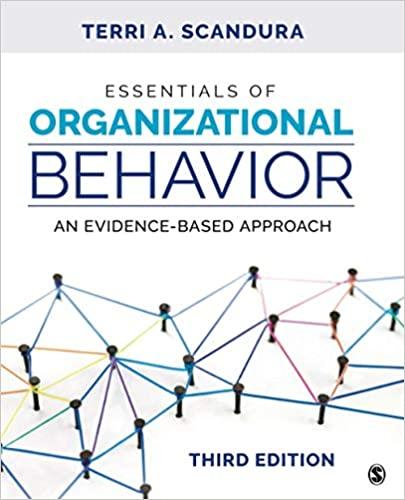Creativity is affectively charged, and complex cognitive processes are shaped by both emotions and moods. Creativity may
Question:
Creativity is affectively charged, and complex cognitive processes are shaped by both emotions and moods. Creativity may be particularly susceptible to affective influence, mainly because positive affect leads to the sort of thought processes that stimulate creativity. Consider these emotional reactions to creative outputs cited in a research study headed by Teresa Amabile at Harvard: I figured out why something was not working correctly. I felt relieved and happy because this was a minor milestone for me. (Female participant in a high-tech company) I smashed that bug that’s been frustrating me for almost a calendar week. That may not be an event to you, but I live a very drab life, so I’m all hyped. No one really knows about it; three of the team that would be involved are out today—so I have to sit here rejoicing in my solitary smugness. (Male participant in a high-tech company) Both individuals are expressing positive emotions resulting from their creativity. Positive affect results in an affect–creativity cycle. This research identified positive affect as an antecedent of creative thought, with incubation periods of up to 2 days. In other words, creativity both evokes and accompanies creative performance. Positive affect has three primary effects on creativity. First, positive affect makes additional information available for processing by increasing the number of associations that can be made. Second, it leads to more complex contexts by defocusing people’s attention on one solution, and this increases the number of things that are treated as relevant to the problem. Third, it increases cognitive flexibility by increasing the probability that diverse cognitive elements will become associated with one another. Also, the ability to control one’s time enhances positive affect, which then increases creativity. The broaden-and-build model suggests that positive emotions, such as joy and pride, broaden a person’s available repertoire of thoughts and actions. The experience of positive emotions leads people to pursue more novel ideas. Positive emotions broaden the scope of attention and the scope of ideas during the creative problem-solving process. Thus, positive affect leads to greater variation and therefore increases the probability of creativity occurring.........
Discussion Questions
1. Discuss the impact of time pressure on creativity. Why is it important to feel in control of time to experience positive affect?
2. Recall an experience where you felt that you had produced a creative work. What emotions did you experience during the time you were being creative?
3. How can leaders create work environments where affect leads to enhanced creativity? Provide an example of this process.
Step by Step Answer:

Essentials Of Organizational Behavior An Evidence-Based Approach
ISBN: 9781544396781
3rd Edition
Authors: Terri A. Scandura





